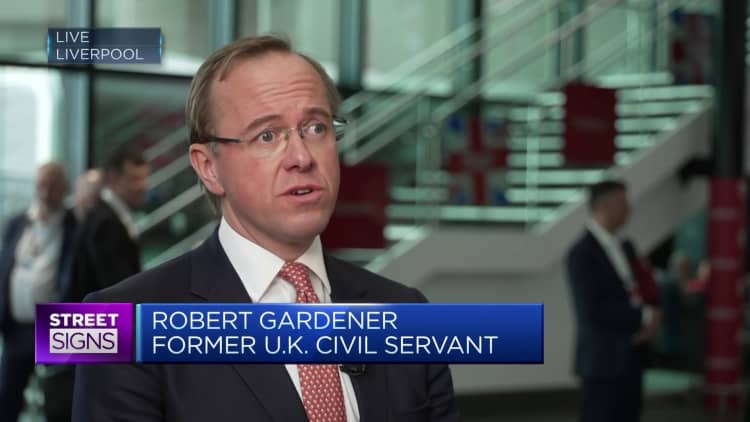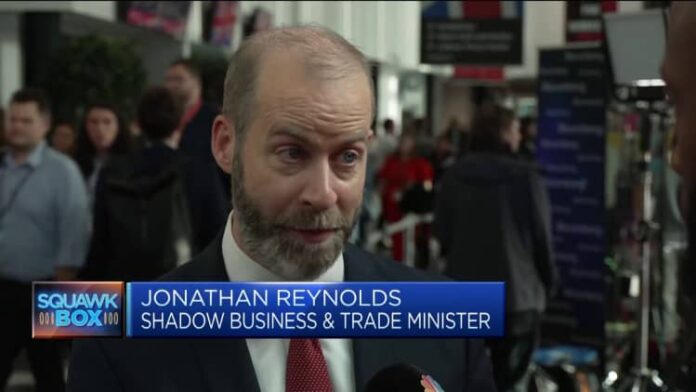LIVERPOOL, UK – October 11, 2023: Keir Starmer, leader of Britain’s main opposition Labor Party, applauds a speaker on the final day of the Labor Party’s annual conference in Liverpool, northwest England, on October 11, 2023.
Paul Ellis | Afp | Getty Images
LONDON — The U.K.’s main opposition party, the Labor Party, last week laid out the economic platform that it hopes will carry it to power in next year’s general election, and the transatlantic parallels were clear.
Labor leader Keir Starmer vowed to “rapidly advance” investment in the clean energy transition, which he said would create half a million jobs and boost economic growth while meeting the country’s climate goals.
“Clean British energy is cheaper than foreign fossil fuels. “That means cheaper bills for every family in the country, but also a chance to make us more competitive overall,” Starmer said at the party conference in Liverpool, England, on Tuesday last week.
“Countries like America are using this gift to create manufacturing jobs the likes of which we haven’t seen in decades, and they’re not the only ones.”
Elsewhere, Shadow Chancellor Rachel Reeves unveiled an economic plan she called “Securonomics” that is rooted in the belief that growth comes “from the bottom up and the center out” – a literal reflection of US President Joe Biden’s economic philosophy .
Reeves vowed last week to “rebuild Britain” as the party aims to de-risk business investment in new technologies with a new national wealth fund, thereby maintaining an active state while using private investment to boost economic growth.
She also promised to overhaul the country’s planning system to speed up infrastructure projects. This plan, they say, will unlock another 50 billion pounds ($61 billion) in private investment.
Reeves said Labor wanted to secure £3 from the private sector for every pound of public money spent in the proposed national wealth fund, and it was widely acknowledged the plan was inspired by Biden’s Inflation Reduction Act (IRA).
Reeves told the conference that business investment is “the lifeblood of a growing economy.”
“They are investments that enable companies to expand, create jobs and compete with international rivals, with new plants, factories and research laboratories coming to Britain – not Germany, France or America,” she said.
“But today we are far behind our peers in private sector investment as a share of GDP, with tens of billions of pounds less being spent on new machinery and infrastructure.”
According to the U.S. Treasury Department, the Biden administration’s landmark IRA legislation, which targets manufacturing, infrastructure and climate change, generated more than $500 billion in investments in its first year, including $200 billion in the clean sector Energy flowed.
Labour’s desired parallels to “Bidenomics” were discussed at numerous fringe events during the Liverpool conference, particularly with regard to the “crowding-in” of private investment – a Keynesian economic theory that suggests higher government spending can lead to higher private investment .
“It’s not Bidenomics”
But while the rhetoric and desired outcomes may sound eerily similar, the key difference between “Bidenomics” and “Securonomics” lies in how proposed infrastructure investments to support long-term growth are financed, said Kallum Pickering, senior economist at Berenberg .
“Because we lack imagination, we have a bad habit of importing American policies and ideas. [Former Prime Minister] “Liz Truss tried Reaganism without the dollar and found that the dollar is actually what you need to run massive deficits and cut taxes,” he told CNBC by phone last week.
Truss lasted just 49 days as prime minister last year after announcing a series of unfunded tax cuts that sent markets and the pound into turmoil, sent mortgage bills soaring and prompted the Bank of England to intervene to stem the collapse of several Prevent pension funds.
However, Truss refused to give in to critics and continued to push for current Prime Minister Rishi Sunak to implement sweeping tax cuts at the Conservative Party conference earlier this month.
“Bidenomics is straightforward – it’s massive debt-financed subsidies to stimulate the supply side of the economy,” Pickering explained.
“The key point is subsidizing debt financing. Just because the measures may be aimed at promoting infrastructure and investment, unless they include that debt financing component, it is not Bidenomics.”

The main reason this wouldn’t work in the UK, he added, was that the US had the “exorbitant privilege” of operating with the global reserve currency: the US dollar.
“The U.S. federal government will run a 6% deficit in a full-employment economy over the next few years – no other country can get away with it. And those deficits are infrastructure subsidies, the CHIPS Act and all these other things of subsidies – that’s not possible in the UK,” Pickering said.
The U.S. national debt passed a historic milestone of $33 trillion last month, with government spending increasing by around 50% between fiscal years 2019 and 2021. The Inflation Reduction Act is expected to cost more than $1 trillion over the next decade, according to a University of Pennsylvania budget model.
Why Britain is different
Pickering noted that U.S. borrowing to generate a subsidy contributes directly to GDP, but at the same time may “push” private investment and encourage borrowing in other parts of the economy to “piggyback” on those subsidies.
“In the case of the UK, since we would not be able to borrow to finance the subsidies or at least not significantly increase the deficit, it would have to be done as a transfer, so taxes would have to go somewhere or someone to subsidize others,” he said.
“And so net – well, if you’re very good at fine-tuning your economy with fiscal policy, and I have my doubts, then you might get more growth out of it – but it won’t be anywhere near the magnitude or the impact of that.” Bidenomics because we can’t borrow that much.”

This need for fiscal discipline was also a central tenet of Shadow Chancellor Reeves’ speech on Monday, when she called for “iron-clad fiscal rules”, directly addressing critics who say her approach is similar to traditional Conservative economic policy.
“Economic responsibility does not diminish the progress of working people. It is the foundation on which progress is built,” Reeves claimed, promising that no tax increases will be announced before the general election.
CNBC Politics
Read more of CNBC’s political coverage:
Pickering pointed out that the strength of Britain’s economy and economy had less to do with a possible change in the party in power and more to do with the stability and elimination of tail risks of a “fragmented Conservative Party” that is still embroiled in internal disputes over various issues be it from Brexit to taxes.
He suggested that the security provided by stronger ties with the EU and Biden’s US that would come with a Labor government would likely make the UK a more attractive destination for foreign investment and eventually allow Labor to ” to loosen the purse strings.”
“So while the Conservatives are aiming to balance the budget within a few years, Labor would probably be able to run a few percentage points of GDP deficit, and that wouldn’t be insignificant,” he added.














